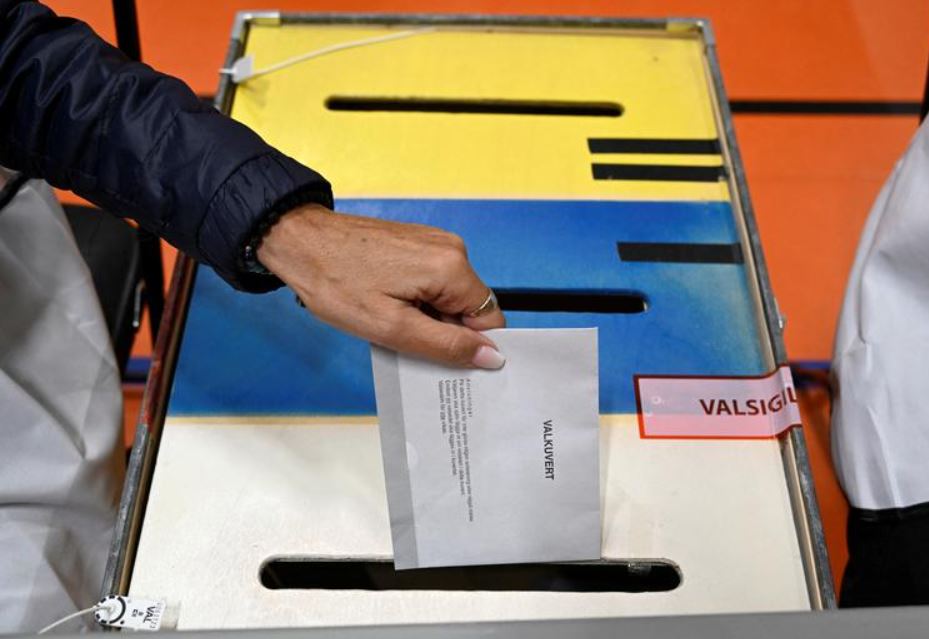The leader of Sweden’s incumbent Social Democrats has resigned as prime minister after conceding defeat in the country’s knife-edge election, handing victory to a loose bloc of rightwing parties that includes the far-right Sweden Democrats (SD).
The PM, Magdalena Andersson, called a press conference at which she accepted defeat, while pointing out that her Social Democrats remained Sweden’s largest party with more than 30% of the vote – and that the majority in parliament for the right bloc was very slim.
When postal votes and those of citizens living abroad were counted on Wednesday, a loose coalition of the SD and the three centre-right parties edged ahead to win a majority of three in the parliament of 349 seats.
There is no formal agreement between the SD and the Moderates, Christian Democrats and Liberals about how they will govern together, although the centre-right parties have said they will not countenance ministerial positions for the far right.
Andersson, the Social Democrats party leader, noted that it was a “narrow majority, but a majority nonetheless”.
“So tomorrow I will hand in my resignation as prime minister, and the responsibility for the continued process will go to the speaker,” Andersson said.
“Now the work begins to make Sweden good again,” the SD leader, Jimmie Åkesson, wrote on Facebook.
“We have had enough of failed social democratic policies that for eight years have continued to lead the country in the wrong direction. It is time to start rebuilding security, welfare and cohesion. It is time to put Sweden first,” he wrote.
Ulf Kristersson, whose Moderate party came third with 19% of the poll and who is now in line to become the new prime minister, thanked voters for their trust and said: “Now we will have order in Sweden.”
The final tally showed that the right bloc won 49.6% of votes, while the left bloc secured 48.9%.
Given the closeness of the vote and the uncertainty over the final outcome, all the parties had refrained from making statements about a possible new government since polling stations closed on Sunday night. However, some of the key battlegrounds for a future rightwing coalition government with SD influence have already become clear.
Swedish television’s flagship news magazine on Tuesday night aired a short interview with the head of the Swedish Committee Against Antisemitism, who expressed concern that the result might encourage racists and repeated earlier accusations that the SD are ambiguous over whether Jews can be Swedes. Björn Söder, formerly party secretary for the SD and a central figure in the party’s leadership, subsequently accused the broadcaster of bias and propaganda and demanded that public service broadcasting should be “fundamentally reformed”. A former Moderate party MP compared public service to “a cancerous tumour” in a tweet.
“I went to the polls to defend human rights and freedoms,” Romina Pourmokhtari told Swedish media. “That is where we Liberals will have to aim our fire in the coming years.”
After emerging from among Sweden’s violent neo-Nazi groups in the late 1980s, the Sweden Democrats have made strenuous and repeated efforts to exclude racists and extremists from their ranks and present themselves as a socially conservative party aiming to defend Swedish national traditions and culture. But a halt to immigration from non-European countries is a central plank of the party’s politics and key to its electoral success. The SD’s stated policy of “open Swedishness” holds that anybody can become Swedish if they learn the language and adopt the culture, but the notion of a Swedish Muslim appears to lie outside this approach, researchers say.
Sweden has become one of Europe’s most ethnically mixed nations since large-scale asylum-based immigration first began in the 1990s and accelerated sharply following the collapse of the Arab spring. For many years, the SD stood alone as the only party opposing immigration, which the party links to the recent rise of gun and gang criminality among second-generation immigrant youth in Swedish cities.
“This is a historic moment, an era has come to an end,” said Jonas Hinnfors, a politics professor at Gothenburg University. “We don’t yet know the magnitude of the change to come, but for the past 50 or 60 years there has been a steady development towards broadly social liberal values, individual freedoms and minority rights, to which both left and right have contributed.
“Whatever happens now, depending on the extent that the SD will be able to exert influence, that development has probably come to an end and we will see a rolling back of some of the things we have taken for granted.”
There was likely to be a new approach to the media, more money for law and order, and a period where Swedishness and loyalty to Swedish values defined from above would be of central importance and would permeate school and university courses, libraries, culture, and the civil service, Hinnfors said. “The direction is clear.”
Source: The Guardian


